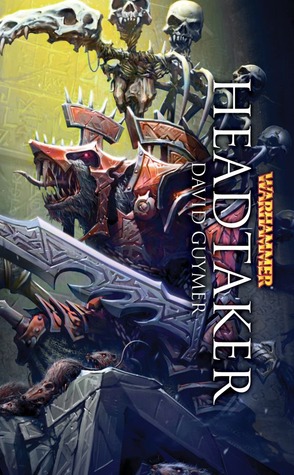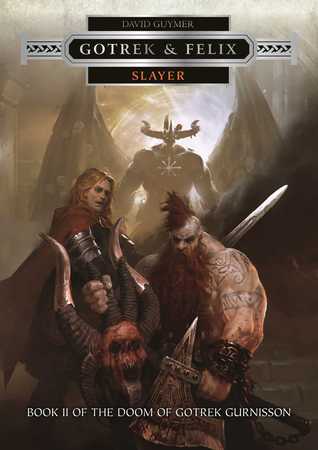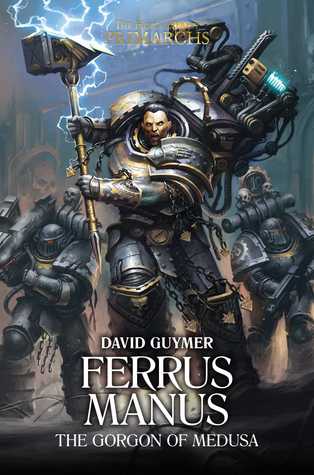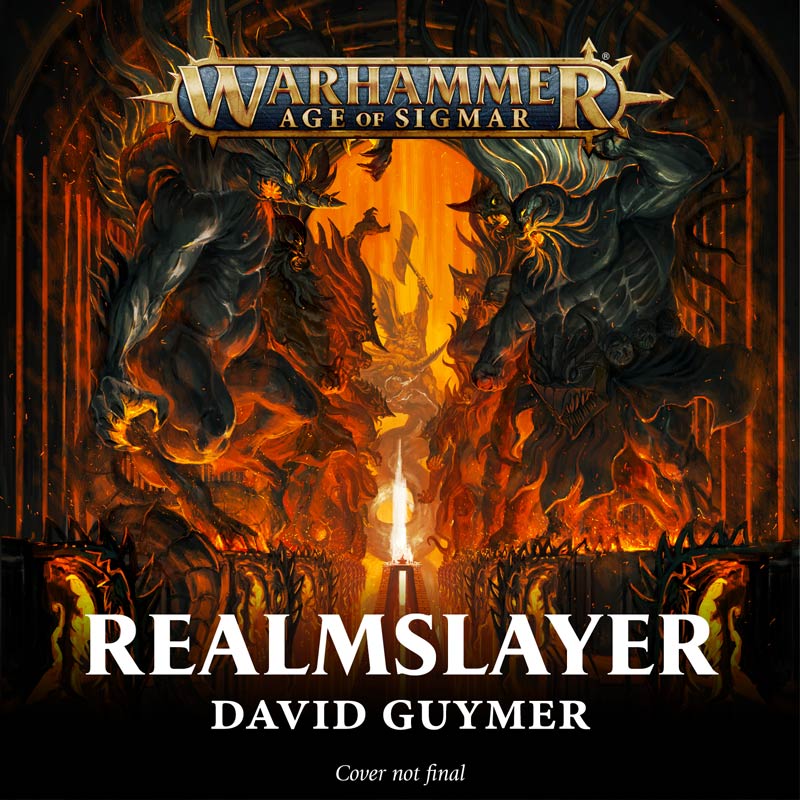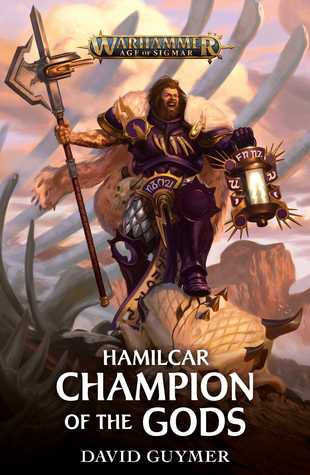Author Spotlight – David Guymer
Joining us for today’s Author Spotlight is David Guymer!
After spending several years and a great deal of effort earning the right to put ‘Dr’ on his driver’s license, David Guymer now writes books and games for a living. He was short-listed for the David Gemmell Award in 2014 for his debut novel, Headtaker, and then again in 2016 for Gotrek and Felix: Slayer. He also wrote the Primarchs novel Ferrus Manus: Gorgon of Medusa, the Siege of Terra novella, Dreadwing, and the bestselling audio drama Realmslayer.
You can find him on Twitter @WarlordGuymer.
Welcome to the Hive, David. Let’s start small: tell us about a great book you’ve read recently!
I read a ton of books, some for pleasure, but as someone who writes tie-in fiction for shared universes for a living, most of the reading I do is what I need to do to write my novels. I also write a lot of novels, generally about 3-4 a year plus short stories and game work so there are times then, as terrible as it sounds, when I’m quite fed up with words and want nothing more than to lose myself in a comic. At the moment I’m reading Hellblazer: Original Sins and its absolutely fantastic. It was first published in 1987, but its storylines about demons walking the earth disguised as investment bankers and voting Tory could easily have been written today.
It’s kind of reassuring to be reminded that however bad you think things are in 2019, it was pretty much the same thirty years ago!
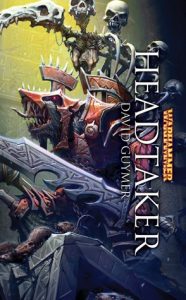 Okay, time to escalate things: reality warps and you suddenly find yourself leading a D&D-style party through a monster-infested dungeon. What character class are you, and what’s your weapon of choice?
Okay, time to escalate things: reality warps and you suddenly find yourself leading a D&D-style party through a monster-infested dungeon. What character class are you, and what’s your weapon of choice?
My first character was a Paladin, and I’ve remained pretty steadfast in my RPG choices since then. In reality though I don’t think I’ve got the upper body strength or the courage of my convictions to last very long as a Paladin. I’d probably be a druid, my favoured weapon an animal familiar, a stick, and barkskin.
When you’re not trawling through dungeons, how do you like to work? (In silence, with music, or serenaded by the damned souls of a thousand dead shrimps? Do you prefer to type or to hand-write? Are you an architect or a gardener? A plotter or a pantser? D’you write in your underwear, or in a deep-sea diver’s suit?) Tell us a little bit about your writing method!
I’m a plotter. I like to have that safety net, and with the speed at which I need to be able to turn around a novels, it helps to have it there. I’ve become more relaxed about how thorough that plot needs to be these days, a product of confidence and experience, but also, if I’m honest of impatience, because a new novel always excites me and I’d always rather be writing it than scribbling character notes and drawing maps. I normally use what I’ve seen described as the Headlight Method. (I’m afraid I’ve long forgotten where I read about it and who was describing it.) Essentially, I know what my final destination is and have a few major landmarks in mind, but otherwise the road ahead is revealed to me as I drive.
I like it. It feels like the best of both worlds.
Once I get to the stage of writing I definitely prefer to do it with ink and paper. There’s something about sitting at a computer that feels immediately restrictive, as if my left-brain takes it as a cue that we’ve got work to. With a pad of paper and a pen I always feel more creative and freer. The whole set-up, kitchen table, morning sunlight, cheap pen, just seems to trick my mind into thinking we can write whatever we like here because it’ll all have to get typed up later. Of course, being one-step removed from social media, YouTube, and online thesauruses doesn’t hurt either. And I prefer to write in silence by the way, resorting to sound tracks only when I’m spell-checking or performing the most boring edits.
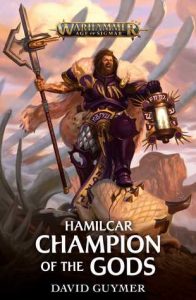 Of course, bending over a kitchen table is murder on the lower spine and my deadlines are generally far too restrictive to allow me to write everything twice so I generally settle for writing the first couple of scenes long-hand. This is enough to settle on a voice and a rhythm and I’ll only then come back to paper if I get stuck.
Of course, bending over a kitchen table is murder on the lower spine and my deadlines are generally far too restrictive to allow me to write everything twice so I generally settle for writing the first couple of scenes long-hand. This is enough to settle on a voice and a rhythm and I’ll only then come back to paper if I get stuck.
I also do a lot of writing for roleplaying games and computer games. This work often comes in handy 200-500 word packages that I’ll almost scribble out on paper as and when. At my daughter’s swimming lesson? Cooking dinner? I’ll have probably written up a couple of quest locations or a few dozen lines of game dialogue while I’m at it.
What (or who) are your most significant fantasy influences? Are there any creators whom you dream of working with someday?
The books I read as a teenager, when I first starting choosing for myself what I was going to read are the ones that have stuck with me and have arguably most influenced my style. Brian Jaques. Margaret Weiss. Terry Pratchett. Robin Jarvis’ books may live on the YA shelf, but The Crystal Prison would probably still give me nightmares if I read it today. Of the writers I’ve read more recently John Gwynne has been a big influence: he writes the kind of fantasy I love, and the sort I want to write.
My great childhood passion, of course, was Star Trek. I watched all the shows, read all the books, collected the CCG, and it even inspired me to initially pursue a career in science. It’s the one geekverse closer to my heart than Warhammer and I would do anything for anyone for a chance to work in it one day.
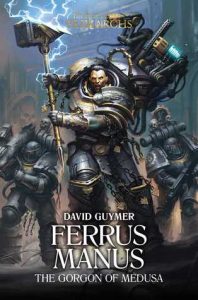 What was the last thing you watched on TV and why did you choose to watch it? Alternatively, what games have you enjoyed recently?
What was the last thing you watched on TV and why did you choose to watch it? Alternatively, what games have you enjoyed recently?
I’ve been trying to teach myself touch-typing and, supposedly to help with that, I’ve been playing a game called Epistory. The premise is a little vague, but I think you are a writer’s muse and you ride around a beautiful, unfolding paper map on the back of a fox, typing words very quickly in order to unlock new areas secrets and kill giant insects. I’m getting pretty good at the game, though when I try to translate that onto an actual manuscript (or an interview for fantasy fansite) I’m still painfully slow.
I’ll be T-Rex typing my novels for the foreseeable future, I fear.
The world shifts, and you find yourself with an extra day on your hands during which you’re not allowed to write. How do you choose to spend the day?
I’d probably take the time to swim regularly or join a gym. I’ve only been writing full-time for a couple of years and it’s amazing how much exercise you miss out on just from walking car park to laboratory and spending a chunk of the working day standing up.
My physique has noticed.
Can you tell us a little something about your current work(s) in progress?
When you write tie-in, you’re always working on something. I’ll be writing something, planning something, or going over the editor’s comments on the last something. Possibly all three at the same time. At the moment things are relatively quiet. I’ve just finished a new set of audio scripts and have been pitching short stories for Black Library’s regular anthology, Inferno, while I wait on edits on the last novel. I have a novel lined up for the summer though that will definitely have Age of Sigmar fans excited.
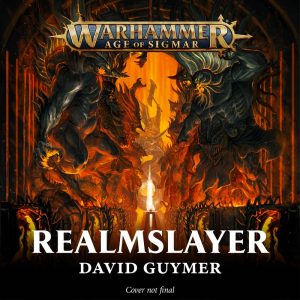 What’s the most (and/or least) helpful piece of writing advice you’ve ever received?
What’s the most (and/or least) helpful piece of writing advice you’ve ever received?
Most of the writing advice that I’ve ever seen is actually pretty unhelpful. It’s well meant and true to the person giving it, but writing is a personal act that no two writers approach in exactly the same way.
Writing criticism, on the other hand, is very different and I’d heartily encourage any writer starting out to go about getting some. In his book On Writing (the only book about writing that you need to own) Stephen King explains that he can mould an average writer into a good one, but no one can make a great one because they’re born. I think that’s true. I was a so-so writer when I took a correspondence course with Writer’s News and my mentor, Marie O’Regan, helped turn me into a good one. I hope she doesn’t ever tire of me citing her in my success because I wouldn’t have achieved any of the things I have in the years since without her and that course.
Every writer encounters stumbling blocks, be it a difficult chapter, challenging subject matter or just starting a new project. How do you motivate yourself on days when you don’t want to write?
I may revert to paper, as I’ve mentioned, or take a long walk to try and work things through in my head. Many writers swear by showers and this works – Nothing attracts inspiration like being in an environment utterly inimical to pen, paper, or any form of electrical device. As a plotter, most forms of writer’s block I encounter can be diagnosed (in hindsight, naturally) as encountering something I’ve failed to think through fully. Issues of motivation are trickier to deal with. In my experience, these are nature’s way of telling you that you need to take a few days away from the desk to do some work in the garden or play computer games. As a freelancer taking time off is one of the hardest things to do, but we need a break as much as anyone.
If you could visit any country at any point in history, where/when would you go, and why?
I’d visit the United Federation of Planets, somewhere around the 24th Century. And I’d probably stay there.
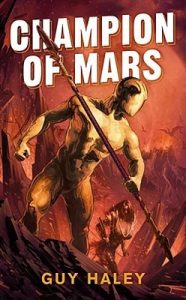 Tell us about a book that’s excellent, but underappreciated or obscure.
Tell us about a book that’s excellent, but underappreciated or obscure.
Guy Haley is one of my favourite writers and Champion of Mars is a great piece of ideas-driven Sci-Fi that more people need to read. It tells the story of Mars from its first colonisation in the near-future across many thousands of years to the last days of humanity and the planet’s decline. The story is told by a huge cast of characters, each living at a different point along this huge arc of time, but are linked in a wonderful way that doesn’t become apparent until the end.
Just to re-iterate.
Great Sci-fi, and well worth a read.
Finally, would you be so kind as to dazzle us with an elevator pitch? Why should readers check out your work?
I’m much less good at promoting myself than I am at promoting Guy Haley, but if you like grimdark fantasy with a healthy dose of humour then you’ll probably enjoy my stuff. If there exists such a thing as a Guymer style then Headtaker or Champion of the Gods are probably the two books I’ve written that cleave closest to it. Or you could check out the audio drama, Realmslayer. It’s got Brian Blessed in it!
Awesome! Thanks again for joining us, David!
Davivd Guymer is the author of numerous grimdark fantasy novels and novellas, many of them set within the Warhammer universe. His next Age of Sigmar novel, HAMILCAR: CHAMPION OF THE GODS, will be released in August.
Check out the full range of David’s writing here.

